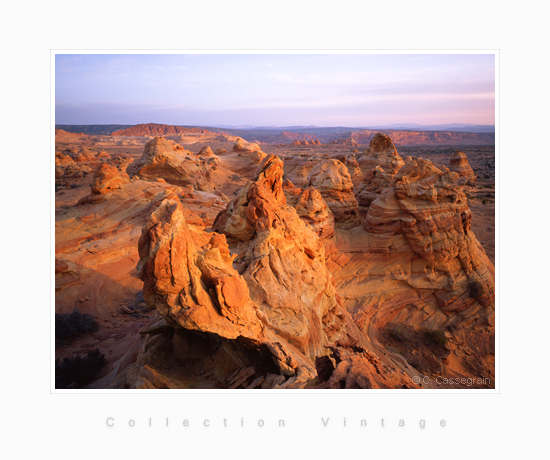



"Take only photographs, leave only footprints." Hamish
Fulton




Rare are the moments when light seems to settle and gently caress the material world. Chance or opportunity - an encounter between the photographer and his subjet. Equipment The use of the photographic medium (view camera) is certainly the noblest of ways to bear witness to the different elements and details of a landscape. It gives the photographer the possibility of becoming a part of the scenery during the different phases of camera adjustment. A photographer takes photographs according to the rhythms of light, not the rhythm of time. The format of the rendered image (from 4x5 inch to 8x10 inch) reveals all the details of the image clearly and precisely. The photographic medium enables several different adjustments (movements), the main ones being: decentration and the Scheimpflug principle (law of conjugate planes). In the context of this specific case, decentration and forward tilt of the camera were used in order to frame the subject as desired.
Morning DreamI walk for about a hundred metres, set down my backpack, then sit on a rock - still cool from the early morning – and for long minutes, I watch the expanse of desert ahead of me... I close my eyes [...] [...] I climb out of my sleeping bag to silence the alarm clock. It's 4H30 a.m., and outside, it's still the dead of night. Dawn won't be here for an hour. By the light of my helmet lamp, I discover that the jeep is glazed with a fine coat of frost. There had been not a sound throughout the whole cold night. I'm in the middle of the desert of Paria Plateau, altitude 1760 metres. The closest town, Page (Arizona), is about fifty kilometers from my camp-site - as the bird flies. I feel like the only person in the world! I boil up some water in the back of the 4x4 to make a cup of 4H50, I adjust my helmet lamp, then move out through the bushes. After a short way, I find the tracks I'd made yesterday while scouting. In the sandy hollows of my footprints, the myriad tracks of tiny beetles. I set off into the night, head down, already thinking about the first ray of light. After 30 minutes of walking, with the silhouettes of the bushes only just visible against the sky, I notice that I'm going too far down towards the North. Lost in my thoughts, I forgot to check the GPS! This is no time to lose time, so I quicken my pace. As soon as dawn appears, I'll only have half an hour to set up the equipment before sunrise. 5H30, I put down the backpack and begin installing the field camera at the spot I chose yesterday. Dawn is approaching, and I can now distinguish the forms of the rock very clearly. A rock labyrinth stretches before me, sharp as razors. I busy myself with the different adjustments to the field camera before obtaining maximum depth of field. 5H50, about 5 minutes before sunrise, I turn East to discover that a fine mist has settled on the horizon. Ideal conditions for gentle, attenuated light. Quickly now, I take the different light measurements, and insert the first film holder into the back of the field camera. Then I wait. The first rays finally appear, but they are still too weak to bring the rock to life. I quickly adjust my measurements, and, at the moment the sun's disk rises completely above the horizon, I trigger the shot. At f45, that requires an exposure of about 12 seconds. The adrenaline is flowing! Moments of eternity facing this landscape which stretches out of sight. The sun stops moving. Its rays paint the scenery with delicacy, revealing the copper and gold colouration of the rock veins. Six sheet films exposed, and now the light measurement for f45 requires a 2 seconds exposure. A quarter of an hour after sunrise, the mist on the horizon begins to dissipate. The temperature is rising, and the shadows become harsher. I take a final photograph. I look at the sky, where a scattering of planes leave white trails of water vapour. So I'm not alone in the world any more! Once I've packed away the equipment, I move carefully about a hundred meters down the rocky crest, set down my backpack, sit on a rock - still cool from the early morning – and for long minutes, I watch the expanse of desert ahead of me... I close my eyes, and begin to dream... April 2010 |
© 1998-2025 - C. Cassegrain Photograph - All rights reserved v.03 - Mobile : +33 6 71 26 04 76 |